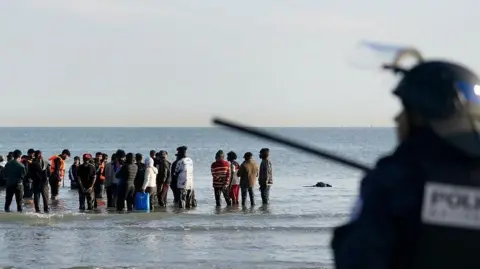UK and France Near Breakthrough Migrant Deal with Focus on Deterrence
UK and France Near Breakthrough Migrant Deal, Focus on Deterrence
In a significant development in bilateral relations, the United Kingdom and France are reportedly on the verge of a major agreement aimed at curbing the perilous English Channel crossings. Senior government officials from the UK express optimism about achieving a breakthrough with French President Emmanuel Macron, potentially leading to France taking back a portion of migrants who have made the dangerous journey in small boats.
This proposed agreement, often described as a “one-in, one-out” arrangement, signifies a crucial shift in diplomatic strategy. While the precise numbers are still being finalized, the core objective, as emphasized by both UK Labour leader Sir Keir Starmer and President Macron, is to establish a robust “deterrent to break the business model of the gangs” facilitating these crossings. The effectiveness of this deterrent, particularly in the short term, will be a key metric by which the success of the deal is measured.
The initial phase of the pilot scheme is expected to involve the return of approximately 50 migrants per week to France. Concurrently, the UK would accept a similar number of asylum seekers from France who are deemed to have a legitimate case for relocation to the UK. This reciprocal arrangement aims to disrupt the established smuggling networks and discourage individuals from embarking on the perilous sea voyage.
However, the proposed scale has drawn scrutiny. Critics, including some within the Conservative party, argue that returning around 50 migrants weekly represents a mere fraction of the total attempting crossings, potentially rendering it an inadequate deterrent. They draw parallels to the UK’s previously planned Rwanda scheme, which was ultimately scrapped following Labour’s election victory, highlighting the contentious nature of such policies.
Despite these reservations, the impending agreement marks a notable advancement in Franco-British cooperation on migration. France’s willingness to accept returns of individuals undertaking the Channel crossing represents a new dynamic in addressing this complex issue. The ultimate success of the initiative, however, will hinge on its scalability and the demonstrable impact it has on reducing the overall numbers attempting the crossing.
The critical question moving forward is whether this deal can be expanded sufficiently to make a meaningful difference. As one senior figure put it bluntly: “do the numbers attempting a crossing start to fall, or not?” For the initiative to be perceived as a success, particularly from the UK’s perspective, a tangible reduction in small boat crossings is essential.

Key Discussions and Future Outlook
The negotiations underscore a shared commitment between the UK and France to tackle the organized crime networks that exploit vulnerable individuals. Both nations recognize that a comprehensive approach is necessary, involving not only border control measures but also efforts to address the root causes of migration and to dismantle smuggling operations.
The pilot program’s initial limited scope is likely a strategic move to test the efficacy of the return mechanism and to build confidence between the two governments. Future phases will undoubtedly be closely watched, with expectations high for a significant scaling-up if the initial results prove positive. The international community will also be observing this development, as it could set a precedent for cross-border cooperation on migration management.
The agreement, while nascent, represents a crucial step forward in a long-standing and often fraught diplomatic challenge. The commitment to a shared strategy, focused on deterrence and cooperation, offers a potential pathway to managing irregular migration more effectively and humanely.



Post Comment